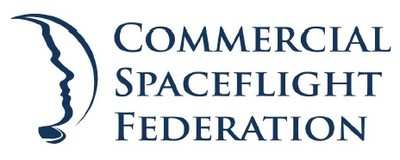Wed, Jul 01, 2009
White Paper On Low Earth Orbit Policy Delivered To White
House
Enabling the development of commercial crew and cargo
transportation to the International Space Station is the central
recommendation of a policy paper submitted by members of the
Commercial Spaceflight Federation tothe Review of U.S. Human Space
Flight Plans Committee, also known as the Augustine Committee.

In less than 18 months, when the space
shuttle is planned for retirement, the United States will become
solely dependent on Russia to send our astronauts to the Space
Station,¨ said Bretton Alexander, President of the Commercial
Spaceflight Federation. "By leveraging the private sector, America
can maximize our utilization of the Space Station and ensure that
NASA has more resources available for robust exploration of the
Moon and beyond.¨
Titled "Commercial Spaceflight in Low Earth Orbit is the Key to
Affordable and Sustainable Exploration Beyond,¨ the policy
paper makes the following major points:
 The key to full utilization of the
Space Station and sustainable exploration beyond low Earth orbit
(LEO) is to turn LEO over to the private sector, thereby allowing
NASA to focus its resources and expertise on exploration of the
Moon and beyond. By making a series of careful, targeted
investments, NASA can affordably and quickly enable the development
of commercial spaceflight capabilities for both people and cargo to
the International Space Station.
The key to full utilization of the
Space Station and sustainable exploration beyond low Earth orbit
(LEO) is to turn LEO over to the private sector, thereby allowing
NASA to focus its resources and expertise on exploration of the
Moon and beyond. By making a series of careful, targeted
investments, NASA can affordably and quickly enable the development
of commercial spaceflight capabilities for both people and cargo to
the International Space Station.
To do so, NASA should create a Commercial Crew Program based on
NASA's existing Commercial Orbital Transportation Services (COTS)
program for cargo to the Station. To maximize benefits to NASA and
the taxpayer, NASA should fund multiple fixed price,
milestone-based Space Act Agreements for development of commercial
crew capabilities, leveraging capital from the private sector.
Regardless of the exploration architecture chosen, government
and commercial spaceflight are not a zero-sum game. They are
complementary, not competitive.
The white paper was delivered to the Augustine Committee on
behalf of the member companies of the Commercial Spaceflight
Federation.
More News
He Attempted To Restart The Engine Three Times. On The Third Restart Attempt, He Noticed That Flames Were Coming Out From The Right Wing Near The Fuel Cap Analysis: The pilot repor>[...]
Make Sure You NEVER Miss A New Story From Aero-News Network Do you ever feel like you never see posts from a certain person or page on Facebook or Instagram? Here’s how you c>[...]
From 2009 (YouTube Edition): Leading Air Show Performers Give Their Best Advice for Newcomers On December 6th through December 9th, the Paris Las Vegas Hotel hosted over 1,500 air >[...]
Aero Linx: NASA ASRS ASRS captures confidential reports, analyzes the resulting aviation safety data, and disseminates vital information to the aviation community. The ASRS is an i>[...]
“For our inaugural Pylon Racing Seminar in Roswell, we were thrilled to certify 60 pilots across our six closed-course pylon race classes. Not only did this year’s PRS >[...]
 NTSB Final Report: Rutan Long-EZ
NTSB Final Report: Rutan Long-EZ ANN FAQ: Turn On Post Notifications
ANN FAQ: Turn On Post Notifications Classic Aero-TV: ICAS Perspectives - Advice for New Air Show Performers
Classic Aero-TV: ICAS Perspectives - Advice for New Air Show Performers ANN's Daily Aero-Linx (06.28.25)
ANN's Daily Aero-Linx (06.28.25) Aero-News: Quote of the Day (06.28.25)
Aero-News: Quote of the Day (06.28.25)




